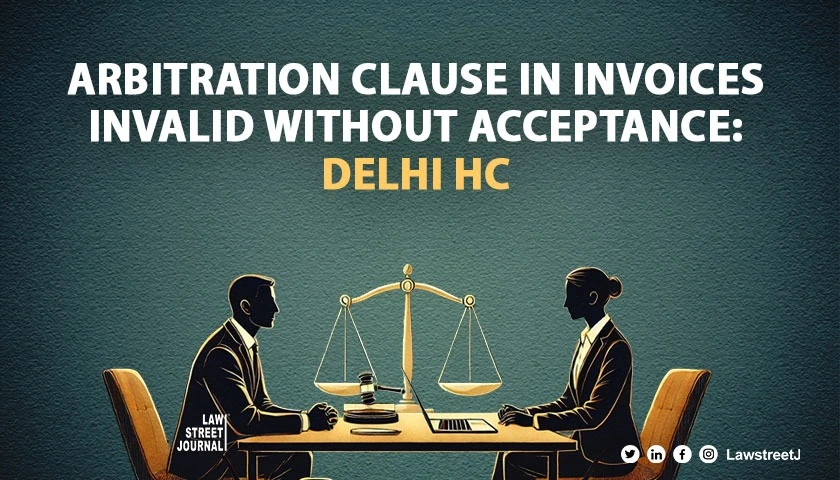New Delhi: The Delhi High Court has delivered a significant judgment, holding that simply including an arbitration clause in invoices does not constitute a valid arbitration agreement between the parties.
Justice C. Hari Shankar, while allowing a petition under Section 14(1)(a) of the Arbitration and Conciliation Act, terminated the mandate of an arbitrator who had been unilaterally appointed by one party.
The court noted that the respondent had sent invoices to the petitioner, which allegedly contained arbitration clauses. However, the court held that since these invoices were neither expressly nor implicitly accepted by the petitioner, they could not be considered to contain a valid arbitration agreement.
The court observed, “They do not contain the signature of the petitioner or anything to indicate that the petitioner had consented to the recitals in the invoices. Indeed, the invoices are practically unintelligible.”
Addressing the requirements for a valid arbitration agreement, the court stated, “It is clear that, even assuming the recitals in these invoices envisage the resolution of disputes by arbitration, since these invoices have not been expressly or by necessary implication accepted by the petitioner, they cannot be said to contain any arbitration agreement between the petitioner and the respondent.”
The court also held that even if there were a valid arbitration agreement, one party cannot unilaterally appoint an arbitrator if the other party does not respond to a notice for arbitration. In such cases, the correct procedure is to approach the court under Section 11 of the Arbitration Act for the appointment of an arbitrator.
The court, while relying upon the judgments of the apex court in Bharat Broadband Network Ltd v. United Telecoms Ltd, Perkins Eastman Architects DPC v. HSCC (India) Ltd, and Haryana Space Application Centre (HARSAC) v. Pan India Consultants Pvt Ltd, held that “unilateral appointment of an arbitrator is completely impermissible. The arbitral proceedings consequent on such unilateral appointment stand vitiated.”
In conclusion, the court terminated the mandate of the unilaterally appointed arbitrator and allowed the petition, emphasizing that there was no valid arbitration agreement between the parties in this case.



![Delhi High Court Sets Aside Arbitral Tribunal's Award Against NHAI in Highway Project Delay Case [Read Judgment]](/secure/uploads/2023/07/lj_9605_23374c2e-392c-4491-a2fe-f2f12fc5272f.jpg)
![Delhi Court Rejects Stay Request in Defamation Case Against Rajasthan CM Ashok Gehlot [Read Order]](/secure/uploads/2023/08/lj_5208_80de1ddc-d76a-4f7f-b180-408e3ae14fb4.jpg)





